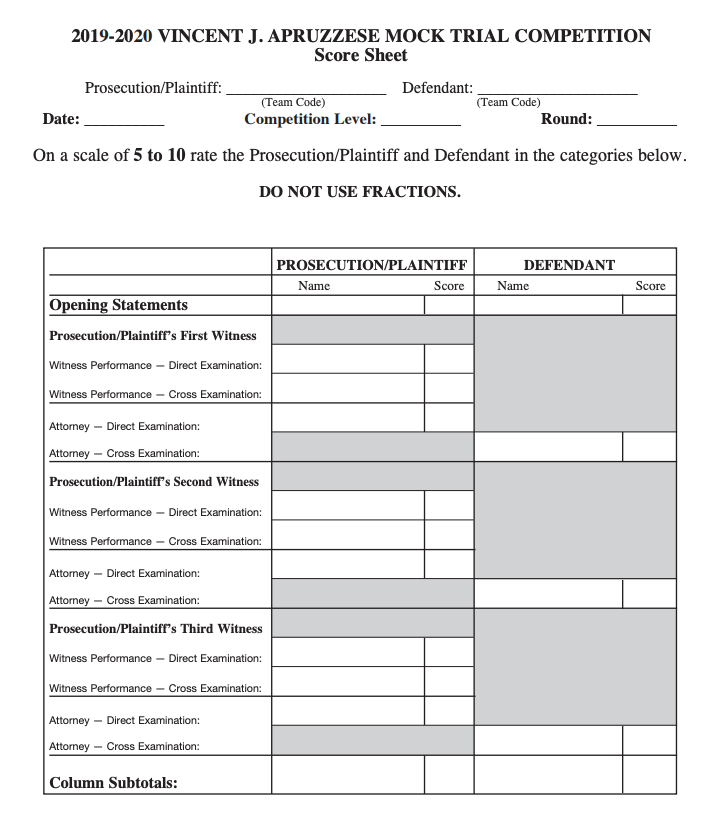
Now don’t get me wrong: I love Mock Trial. Some of my favorite memories and closest student relationships over the years come from the activity. I don’t think there’s a more academically challenging and rigorous activity in high school (at least on the liberal arts side of things). But there is one enormous problem that has rankled me for 23 years of coaching.
Imagine a student completed a multiple choice quiz in my class and I enter a D in the gradebook. The student in this newfangled era of technology sees the grade and says: “Wow, I thought I did a lot better than that. Can I see the quiz?” I, of course, say “No.”
Sound far-fetched? That’s pretty much what the New Jersey State Bar Foundation does in its competition. According to its rules:
Better understanding is promoted among students and teachers if the judge(s) in a mock trial takes a few minutes following the enactment to explain his/her decision(s) regarding the teams’ presentation. Judges will provide a qualitative evaluation of each team’s performance. They will not release numerical scores. [emphasis added]
Last week I wrote about the painful history of poor arithmetic skills leading to incorrect decisions being announced. I expressed appreciation for the county doing the right thing rather than succumbing to the temptation to bury the truth out of sheer embarrassment. Of course, if the scores were posted, a mathematical error would be discovered nearly instantaneously.
I don’t know that any other county does it this way, and in fact am aware that several counties hold multiple rounds in one day, necessitating a same-day (same-hour, really) decision. In those locations — and in Somerset County before the adding debacles — the judges would talk for a few minutes giving some version of this speech:
I really have to hand it to these students, especially the attorneys, who acquitted themselves with poise and maturity far beyond their years. Why, I think a lot of practicing attorneys would have learned something if they were in the courtroom today!
The decision tonight was extremely difficult. In fact, the two teams were separated by just one point! There are no losers here tonight. In my book, you’re all winners. But according to the rules we had to pick someone. In this matter, we rule for…
Typically they will have prefaced this with some extremely vague remarks about something they liked or didn’t like in the trial. Maybe give some general tips about how to handle a difficult witness on cross-examination. Sometimes it’s focused on their particular peccadillo as a practicing solicitor (many of the “judges” are actually attorneys). What they don’t talk about is why Team A was superior to Team B, or what Team B could have done to win. In essence, the students get their grade back and don’t know why — beyond glittering generalities — what they need to improve on. In educational terms, it is without any pedagogical merit.
So why do they do it? I’m sure it’s because they rely on volunteers to be their judges and they don’t want to put them into the uncomfortable position of saying something negative about a kid. They aren’t typically accustomed to this interaction, and having to make the comments — and even worse, potentially deal with fallout from disgruntled parents or students — might be a dealbreaker for potential volunteers.
I get it. But what other competitions have secret scoring? Most sports have scoreboards to tally up goals or points. Competitions like gymnastics, Robotics, and marching band have publicly posted scores from judges, often broken down by specific categories which serve as a form of feedback.
When you combine the utter subjectivity of judging in these cases, it really creates a difficult situation. A team can execute their plan with nary a flaw, but the judges might decide they lost. Sifting through the vague hints given in the post-trial debriefing doesn’t usually give much clarity. A public score sheet, on the other hand (or heck, even a private one given to just the coaches!) would be a huge help to coaches and the competitors. I’ve provided unsolicited feedback on this point since I started coaching back in 1993, but nothing has changed. It is a shame.
P.S. The County finals were last night. They surprised us by not delaying the announcement… that we are the 2020 County Champions! First one since 2011, fifth overall. The judges gave generous praise, but very little feedback. They invited the students to come up at the end of the trial to ask questions, which was appreciated. But the thing that would have been most helpful would be the scoresheet.
